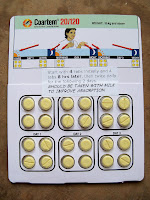So. Malaria. Basically, a person gets malaria from the bite of a mosquito infected with Plasmodium parasites. The parasites get into the bloodstream, mess up the red blood cells, and start making the person all feverish and then really, really sick. If another uninfected mosquito bites that sick person then that mosquito becomes infected and can pass on
Plasmodium parasites to the next person it bites.
 |
| Image thanks to iayork.com |
Only female Anopheles mosquitoes can infect humans with the Plasmodium parasites that cause malaria. (Italics because it's the Latin name,not because I'm trying to be extra emphatic.) There are different strains of Plasmodium parasites, some more dangerous than others, and here in Senegal we have mostly Plasmodium falciparum, which is pretty much the worst kind. You can avoid getting malaria by taking prophylactic medications like doxycycline, mephloquine (Lariam), or atovaquone (Malarone). If, for whatever reason, these medications aren't an option you can reduce your chances of getting malaria by using insect repellent, sleeping under a bed net, and getting rid of standing water and other mosquito breeding grounds.
If you do get malaria there are effective, affordable treatments available, even in places with chloroquine-resistant malaria, like Senegal. Our Health Center is usually well-stocked with government- and NGO-subsidized Malaria Rapid Tests and Coartem medication packs, especially during rainy season, when most malaria cases happen. Here are photos of the Coartem for adults that Peace Corps gave me (but which I will hopefully never need because I'm good about taking my prophylaxis) and also of a pack of Coartem for children that's available at the Health Center.
This past Wednesday was World Malaria Day, and people all around the world did activities and held events to acknowledge the damage caused by malaria and to raise awareness of how to prevent malaria. In Salémata, my village, Wednesday was also when our Health Center has its monthly vaccination and growth monitoring activities. We didn't do anything huge because it was already a pretty busy day, but we did have an informal causerie discussion with the mothers who had brought their babies to be weighed and vaccinated and who were just hanging out, waiting for the nurse to call them up. Adama Dioulde Diallo, one of the women who does community outreach Salémata, used my little set of info cards to give little presentations on how to properly use and care for Long-Lasting Insecticide-Treated Nets (LLINs) and we talked about setting up a bednet care-and-repair activity sometime soon.
 |
| Adama Dioulde Diallo |
If you like maps and are interested in learning a little more about malaria, please check out the CDC's fantastic Interactive Malaria Map. It's neat.


No comments:
Post a Comment
Note: Only a member of this blog may post a comment.